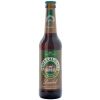Hofbrauhaus Freising - Dunkel
-
ABV:
5.2% -
Bottle Size:
330-ml -
Serving Temperature:
45-50° F -
Suggested Glassware:
Pilsner Glass, Flute
Freising’s Dunkel presents a deep, dark mahogany color with crystal clarity and a head of fluffy beige foam. On the nose, look for prominent toasty and bready notes with hints of hard pretzels, merging with deep-down caramelization amidst flashes of dried dark fruits which conjure impressions of date, raisin, and fig. Expect the story to continue on the palate as a super-flavorful and deep caramel character – which is emblematic of the painstaking decoction mash technique employed by Bavarian brewers – holds the center as boldly toasty bread crust impressions envelop it, and those dried fruit notes offer further intrigue. Carbonation comes across with a welcome spritely quality to offer a pleasant lift to the whole experience. We enjoyed this dunkel’s rich and satisfying character that’s never overbearing in weight or sweetness, and the very manageable 5.2% ABV makes it very easy to knock back more than one of these. It’s also incredibly food-friendly. We’d recommend coordinating the toasted bread notes in the beer with bready or breaded foods. Soft pretzels with stone ground mustard, grilled bratwursts on a bun with sauerkraut, and barbecue chicken pizza come to mind. Roasted meats and root veggies sound good to use, too, as does a snack of pungent cheeses. Prost!
Germany is home to some really, really old brewing enterprises, and Hofbrauhaus Freising, located in the city of the same name (known as “the heart of old Bavaria”), is definitely among the oldest. Documents indicate brewing was underway as far back as 1160, by Bishop Albert I of Harthausen. Back then the church was an extremely powerful political body, and the brewery remained in their hands through the construction of a new brewhouse in 1620 by Prince-Bishop Veit Adam, all the way to the beginning of the 19th century. It was then, in 1803, during a major secularizing shift in Germany, that ownership of the brewery left the church and came into the hands of the state of Bavaria.
In 1911, while the brewery was under the ownership of the counts Moy de Sons, a new brewery was designed and constructed by Theodor Ganzenmüller in the style of Art Nouveau. Ganzenmüller, a professor and brewing scientist at the nearby Weihenstephaner Academy (Weihenstephan is home to the oldest operating brewery in the world, dating to 1040), designed the new brewhouse as a prototype for a new, modern style of brewery. When the beer first flowed in October of 1912, the brewery was the most advanced in all of Germany. Though upgrades and further modernizations have occurred since that time, it would appear Ganzenmüller knew what he was doing as the facility is still home to Hofbrauhaus Freising's brewing operations to this day.
Currently, Hofbrauhaus Freising is owned by the Bavarian counts of Törring-Jettenbach. The brewery produces pilsners, dark lager, märzen (Oktoberfest-style beer), multiple wheat beers, and even a line of non-alcoholic Caribbean-inspired lemonades and fruit drinks made with the brewery's incredibly pure spring water from their 120-meter-deep well. For more info about the brewery, their restaurants, and beer gardens, visit www.hofbrauhaus-freising.de/en/.

Unmatched Variety by style, brewery & country
Choose from Five different Beer Clubs offering unmatched variety by brewery,
country of origin, and beer style to suit your specific tastes.


